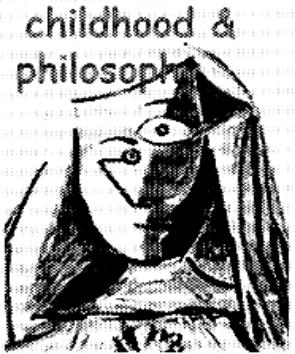emotion, disequilibrium and attentive compassion
confronting emotions in the community of philosophical inquiry with simone weil & ann margaret sharp
DOI:
https://doi.org/10.12957/childphilo.2025.89714Keywords:
simone weil, attention, inquiry, compassion, emotionAbstract
The expression of emotions within the Community of Philosophical Inquiry (CPI) can be challenging. Despite Matthew Lipman’s insistence that emotions are choices and judgements, there can be a tendency to conflate the CPI’s reasonableness with an emotion-free space of rationality. Where feeling in the CPI is theorised, it is often read on a general level as atmospheric collective feelings that facilitators might ‘check-in’ with at the end or beginning of a session. However, the reality within CPIs is quite different. Emotions can arise suddenly, making their negotiation challenging for the facilitator. We theorise that, rather than calling for empathy, these moments require compassion, resourcing that account of compassion with the thought of Simone Weil and Ann Margaret Sharp. Theorising the negotiations of emotional contributions in inquiry with Sharp and Weil reminds us of the risk of reductively reading others whose emotions and situations are radically unlike us. Their account provides us with resources to explain how the productive CPI explores emotions together. In particular, Simone Weil supports our account of attentive compassion towards the world of the other, to theoretically explore what happens between participants in a fruitful CPI when emotions are expressed. To do so, we take Sharp’s account of the CPI, which we argue is deeply inspired by her reading of Weil. This paper frames the phenomenon of emotion expressed in the community through examples from practice, provides an account of attentive compassion through recent Weilian scholarship, and applies this to the CPI to frame it as a space of attentive compassion.
Downloads
References
Bourgault, S. (2016). Attentive Listening and Care in a Neoliberal Era: Weilian Insights for Hurried Times. Ethics & Politics, 18(3), 311–337. https://sites.units.it/etica/2016_3/BOURGAULT.pdf
Burnett et al. (2019). 12 Theses of Attention. https://friendsofattention.net/sites/default/files/2020-05/TWELVE-THESES-ON-ATTENTION-2019.pdf
Dianetti, M. (2025). Against Unreality: A Literary Ethics of Attention to Suffering with Simone Weil, Iris Murdoch, and Elsa Morante [Doctoral dissertation, University of Galway] https://researchrepository.universityofgalway.ie/entities/publication/bf58b72a-d6f0-4519-8325-8b5b1d503adb
Dianetti, M., & Elvis, L. (2025). “From Desiring to Inquiring: ‘setting the stage for attention’ through philosophical dialogue.” Attention (E-Journal on Simone Weil).
Düringer, E.-M. (2022). Murdoch and Weil. In S. C. Panizza & M. Hopwood (Ed.), The Murdochian Mind. Routledge.
Elvis, L. (2023). Attentiveness, Qualities of Listening and the Listener in the Community of Philosophical Inquiry. childhood & philosophy, 19, 1–22. https://doi.org/10.12957/childphilo.2023.76451.
Elvis, L., & Dianetti, M. (2024). Attending to Adolescence Experience through Greek Tragedies. Philosophy and Literature in School Special Issue, 11(2), 43–60. https://jps.bham.ac.uk/22/volume/11/issue/2.
Fletcher, N. M., Gregory, M. R., Shea, P., & Sykes, A. (2021). The story circle as a practice of democratic, critical inquiry. childhood & philosophy, 17.
Fletcher, N. (2021). Imagining the Ineffable: Elucidating Tacit Knowledge through Deliberate Imagining. Analytic Teaching and Philosophical Praxis, 41(2), 1-18.
Jesson, S. (2017). Compassion, Consolation, and the Sharing of Attention. In R. RozelleStone (Ed.), Simone Weil and Continental Philosophy. Rowman and Littlefield.
Kennedy, David. (1997). The Five Communities. Inquiry: Critical Thinking Across the Disciplines, 16(4), 66–86. https://doi.org/10.5840/inquiryctnews19971647.
Lipman, M. (1998). Lisa. Nitschmann Middle School.
Lipman, M. (2003). Thinking in Education. Cambridge University Press.
Murris, K. (2000). The Role of the Facilitator in Philosophical Inquiry. Thinking: The Journal of Philosophy for Children, 15(2), 40–46. https://doi.org/10.5840/thinking200015217.
Oliverio, S. (2018). The teacher as liberator. Ann Margaret Sharp between philosophy and teacher education. In M. Gregory & M. Laverty (Ed.), In Community of Inquiry with Ann Margaret Sharp: Childhood, Philosophy and Education. Routledge.
Peirce, C. S. (2012). Philosophical writings of Peirce. Courier Corporation.
Sharp, A. M. (1978). Simone Weil on Friendship. Philosophy Today, 22(4), 266–275.
Sharp, A. M. (1993). The Ethics of Translation. Critical and Creative Thinking: The Australasian Journal of Philosophy for Children, 1(1), 10–17.
Sharp, A. M. (2009). Caring Thinking and Philosophy of Emotions. In D. G. Camhy (Ed.), Dialogue - Culture - Philosophy. Philosophizing with Children in Transcultural Environments. Academia.
Sharp, A. M. (2018a). Self-transformation in the community. In M. Gregory & M. Laverty (Eds.), In Community of Inquiry with Ann Margaret Sharp: Childhood, Philosophy and Education. Routledge.
Sharp, A. M. (2018b). The role of intelligent sympathy in educating for global ethical consciousness. In M. Gregory & M. Laverty (Eds.), In Community of Inquiry with Ann Margaret Sharp: Childhood, Philosophy and Education. Routledge.
Sharp, A. M. (2018c). The Other Dimension of Caring Thinking. In M. Gregory & M. Laverty (Eds.), In Community of Inquiry with Ann Margaret Sharp: Childhood, Philosophy and Education. Routledge.
Sharp, A. M., & Laverty, J. M. (2018). Looking at others’ faces. In M. Gregory & M. Laverty (Eds.), In Community of Inquiry with Ann Margaret Sharp: Childhood, Philosophy and Education. Routledge.
Sharp, A. M., & Gregory, M. (2018). Towards a feminist philosophy of education. Simone Weil on force, goodness, work, method and time. In M. Gregory & M. Laverty (Eds.), In Community of Inquiry with Ann Margaret Sharp: Childhood, Philosophy and Education. Routledge.
Shea, P. (2018). Do we risk what is most precious in Philosophical Inquiy? In M. Gregory & M. Laverty (Eds.), In Community of Inquiry with Ann Margaret Sharp: Childhood, Philosophy and Education. Routledge.
Teuber, A. (1982). Simone Weil: Equality as Compassion. Philosophy and Phenomenological Research, 43(2), 221–237. https://doi.org/10.2307/2107530.
Weil, S. (1951). Waiting on God (E. Craufurd, Trans.). Routledge and Kegan Paul LTD.
Weil, S. (2003). Gravity and Grace (E. Crawford & M. von der Ruhr, Trans.). Routledge.
Weil, S. (2015). Late Philosophical Writings (E. O. Springsted, Trans.). University of Notre Dame Press.
Zanetti, L. (2024). Learning from Suffering in the Community of Philosophical Inquiry: ‘Leaving Our Grasping Egos Behind’. In The Pedagogy of the Community of Philosophical Enquiry as Citizenship Education. Routledge.



